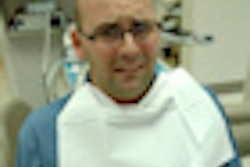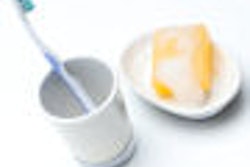
When dentists and their staff ask their patients simple questions, they shouldn't expect truthful answers. That's the take-home message of a recent survey, in which more than four in 10 adults admitted they would tell their dentists they always brushed for the recommended time -- even if it weren't true.
One in four, meanwhile, said they would fib about flossing, too, according to a Harris Interactive poll of 1,001 U.S. adults. The survey was commissioned by Philips Sonicare and the nonprofit group Oral Health America. (Harris declined to provide a margin of error.)
While those numbers might seem high to the straight shooters of the world, experts on lying suspect that the percentage of dental patients who embellish the truth is a lot higher than that. And it illustrates why asking direct questions may not prove the best means of helping patients improve their oral health.
"People lie all the time," said Michael Lewis, Ph.D., a psychiatry professor at the Robert Wood Johnson Medical School in New Jersey, who contends that lying is just as common as truth telling. "I would lie if the dentist asked me about flossing."
Why patients lie
“You've got to be really stupid not to lie.”
— Michael Lewis, Ph.D.
Patients tell white lies for many reasons, ranging from wanting to please authority figures to avoiding shame and punishment. No one wants to admit their slothful ways, let alone get a lecture on hygiene. And who wants to aggravate a dentist wielding a syringe?
In such vulnerable situations, lying is "almost a reflex," said Marian Stuart, Ph.D., also a professor at the Robert Wood Johnson Medical School.
"You've got to be really stupid not to lie," said Lewis, citing a study that found children who don't lie have lower IQs. "People lie because they don't want to be scolded."
People lie especially frequently to dental receptionists, said Gary Kadi, who heads NextLevel Practice, a dental management consulting firm in Scottsdale, AZ. In one of his surveys, only 15% of patients told receptionists why they were really canceling appointments, said Kadi, whose clients can have cancellation rates as high as 50%.
When patients finally make it to the dentists' chair and are asked about their oral health habits, they often aren't thinking about brushing or flossing at all, said Dorothea Lack, Ph.D., a former hygienist who's now a psychologist in San Francisco. "They want the doctor to like them," she said. Some patients believe that if dentists and hygienists approve of their patients, the patients will get better care.
On one hand, patients visiting new dentists or hygienists may be embarrassed to admit that they don't brush properly, said Timothy Smith, Ph.D., a behavioral science professor at the University of Kentucky College of Dentistry. "They aren't going to tell a stranger intimate things, even if it's just about dentistry," he said.
On the other hand, those who consider their dentists or hygienists old friends, meanwhile, may tell white lies to spare their feelings. "They don't want to let them down," Smith said.
Then there are the people who lie to themselves. Some may really believe that they have acceptable hygiene habits, while others can't bear to admit to themselves that they are neglecting their oral health.
More concerning than patients who fib about hygiene are those who don't mention that they suffer from debilitating diseases -- a crucial omission that could lead to serious medical complications. For example, a patient who lies about having had endocarditis might not receive the antibiotics recommended before dentistry.
Of course, dentists also want to know if patients carry contagious diseases, such as hepatitis or AIDS. When patients don't reveal the information, they are not necessarily being malicious, Smith said. "People like to forget they have these problems."
Finding the truth
So how can dentists get patients to be more truthful? The first step: forget the yes and no questions. After all, dentists don't really need patients to plead guilty to poor hygiene. Teeth don't lie.
In the Japanese culture, people rarely ask questions, yet they achieve a lot, according to Lewis. Avoiding questions "turns out to be a useful strategy," he said.
While it would be nice for patients to talk openly about their hygiene habits, remember that finding out the truth is not the ultimate goal. It's far more important for dentists to build strong relationships with their patients -- and convince them to become more compliant, Kadi said.
"You can accomplish anything in the context of a good relationship," Lack agreed.
One way to build good relationships: active listening. Dentists should get in the habit of repeating patients' answers to questions, so they can be sure that they are hearing them correctly, Smith said.
Using nonverbal behavior is important, too. Dentists can encourage patients to open up by leaning forward, maintaining eye contact, and nodding often, Smith said.
Ask open-ended questions and listen for offhand remarks -- comments that don't sound quite right, or what Smith calls "zingers." For instance, a dentist talking to a patient about health problems may conclude a conversation with "Anything else?" If the patient responds with "Nothing important," that's when it's important to follow-up, Smith said. Ask "Nothing important?" and the answer may be "Well, I have these problems in my heart."
Dentists should not be satisfied with a patient's first answer, psychologists say. It's often helpful to ask the same question in different ways and move from general, open-ended questions to extremely specific ones. Dentists can ask patients directly if they are on specific medications, and explain why they need to know.
Creating a nonthreatening environment is key, psychologists say, with some suggesting that dentists go so far as to normalize undesirable behavior. Stuart advises that dentists say something such as "Most people don't floss every day. They don't brush every day. Tell me what you do." Ask patients what makes it hard to have better hygiene habits, and look with them at what the barriers are, she said.
Loving the liar
Look for teachable moments, psychologists say. If patients have bleeding gums, they may be more interested in learning how to properly floss.
To convince patients to take better care of their teeth, praise something, Lack suggested. "They're probably doing something right," she said. "Whatever you praise, you get more of that."
Patients are "expecting to be beat up," said Kadi, the management consultant. Surprise them and tell them something good, he said, even if it's just "you've got good bone structure."
Too many dentists focus on the means such as tooth brushing, rather than the patients' ends: the desire to have a sexy smile or live long enough to watch their children grow up.
"Look beyond the soft and hard tissues, and get to the emotional issues of the patient," he said. With this philosophy, he said, his clients have not only been able to convince their patients to be more compliant, but the dentists have also reaped big financial rewards. He said his more than 600 clients saw their collections grow an average of 37% from May 2007 to May 2008, despite the poor economy. And appointment cancellations are down. "People buy for emotional reasons," he said.
Finally, don't take patients' behavior personally, Lack said. Don't be annoyed if patients lie or even if they don't comply with your instructions. "Patients don't feel well. They may be afraid," she said. "Healthcare workers forget: It isn't about the doctor."
Honestly.



















